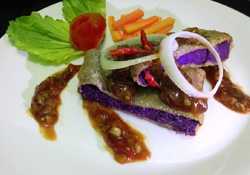Helping families grow a sustainable surplus in Indonesia
Smallholder farmers at Cargill’s PT Hindoli palm oil plantation are growing crops sustainably – and earning additional income
November 24, 2015
According to the United Nation’s World Food Programme, one out of every nine people on the planet do not get enough food to be healthy and lead an active life. At the same time, the world has the resources to feed everybody. Statistics in Indonesia show the same picture. The country produces enough food to feed its entire 245.6 million population, says the Economist Intelligence Unit, yet it ranked only 65th out of 105 on that publication’s 2012 Global Food Security Index.
Indonesia’s problem in a nutshell: There is enough food, but many people have a hard time getting it. That’s why, on World Food Day in October, Cargill’s PT Hindoli palm oil plantation in South Sumatra showcased how it is doing its part in addressing that problem.
“The challenge we’re facing lies not in the supply, but in access to safe, nutritious and affordable food,” said Dr. Merryah, Hindoli’s company doctor. “Rural communities in Indonesia have to deal with severe hunger and malnutrition. UNICEF states that over a third of children under the age of five suffer from stunted growth due to malnutrition. When they are young, it affects their personal and educational development. When they reach adulthood, it reduces their productivity and income.”
Small scale farming
Cargill has worked with over 9,600 smallholder farmers in South Sumatra’s palm oil industry since 1996. Sustainable practices have been one of the main focuses of the partnership. The training and technical assistance provided to these farmers have changed their lives dramatically.
 At Hindoli’s World Food Day celebration, students, local communities, employees, and governments learned about the concept of a low-carbon footprint diet.
“With increased yields and income from sustainably grown fresh palm fruit bunches using sustainable practices, I can now feed my children better and provide them with further education,” says Agus Arz, head of Sumber Jaya Lestari smallholder cooperative in Mekar Jaya Village.
At Hindoli’s World Food Day celebration, students, local communities, employees, and governments learned about the concept of a low-carbon footprint diet.
“With increased yields and income from sustainably grown fresh palm fruit bunches using sustainable practices, I can now feed my children better and provide them with further education,” says Agus Arz, head of Sumber Jaya Lestari smallholder cooperative in Mekar Jaya Village.
Now, the partnership has moved beyond just palm oil. In 2012, Hindoli started a small-scale commercial farming project for its employees and the local community. The initiative was grounded in the knowledge that subsistence farming (families cultivating just enough crops for their own consumption) is not sustainable in the long term for the farmers themselves or beneficial for the community at large. Hence, the plan was conceived to help families grow a surplus they could take to market.
Cargill employees began growing vegetables such as spinach, kangkong (water spinach), chili peppers and tomatoes at a two-hectare farm in the Teluk Kemang Village. They produced these nutrient-dense vegetables in line with agricultural best management practices and sold them to their co-workers and the local community at very affordable prices.
Building on that initial success, Cargill’s vegetable project now includes 20 farmers who grow produce to supplement their families’ incomes. And that’s not all. With local demand for duck meat and eggs on the rise, Hindoli started a duck breeding project last year, enabling 20 members of a youth group to raise their own birds and make extra money.
Urban farming techniques are next on the list. Hindoli’s team will help local homemakers supplement their families’ incomes with commercial crops grown in their own backyards. They’ll use environment-friendly hydroponic gardening techniques, which require no soil and just a small amount of water.
Low carbon diets
Part of sustainable farming is reducing emissions of carbon dioxide, the greenhouse gas that’s the principal cause of climate change. One of the many ways to lower carbon emissions is to change one’s diet and choose ingredients with a low carbon footprint.
At Hindoli’s World Food Day celebration, students, local communities, employees, and governments learned about the concept of a low-carbon footprint diet. The celebrations culminated in a low-carbon footprint recipe competition. Employees were challenged to create recipes using ingredients that produce little carbon. The final dish must be tasty, innovative, affordable, and environment-friendly. Low-carbon footprint ingredients include sweet potatoes, oyster mushrooms, and vegetables such as carrots and green lettuce.
“It is not just about the taste, but also being mindful about the greenhouse gases we produce while cooking. This is a quite a challenge, but it was fun researching and learning about it,” said Ina Rahmawati, a senior clerk at Hindoli’s Sungai Pelepah Estate, who came up with the idea of making a steak from steamed purple sweet potato encased in a paper thin layer of catfish.
The 20 winning recipes from Cargill’s oil palm plantations in South Sumatra and West Kalimantan will be featured in a collection titled “20 Scrumptious and Planet Friendly Indonesian dishes.”
